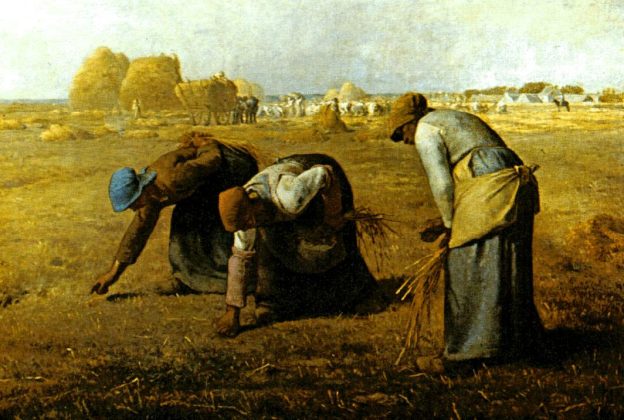
We need to talk about : Gleaning in the 21st century: old traditions and new solutions for our waste-conscious world

Jean-François Millet, Des Glaneuses, 1857 oil on canvas, Wikiart
“...there was a time when your fathers, your husbands and your brothers were so often awakened by the call of the gleaner’s drum..." — Critic, Léon Daléas
The 19th century social and class critique levied by Millet’s painting of foregrounding women gleaners scavenging harvest leavings contrasted by the harvest’s wealth and the miniscule overseer in the background still resonates globally today. His painting inspired French New Wave filmmaker, Agnès Varda’s (2000) documentary, “The Gleaners and I.” Following collage artist Louis Pons’ admonition, “junk is a cluster of possibilities” forcing us all to not fritter away our resources. Anyone outside of the economic elite out of necessity or for ethical reasons is tethered to obtaining adequate food, contending with waste, recycling, upcycling and repurposing of ingredients, prepared dishes, containers.
Anyone outside of the economic elite out of necessity or for ethical reasons is tethered to obtaining adequate food, contending with waste, recycling, upcycling and repurposing of ingredients, prepared dishes, containers.
Our October Kitchen Table Conversation will include Eleanor Barnett, author of 'Leftovers: A History of Food Waste and Preservation', where she explores the ingenious ways our ancestors have extended the life of the foods they ate through preservation and recycling of food scraps; and Usha Thakrar, Executive Director of Boston Area Gleaners, (BAG). Her organization is committed to improving access to affordable, healthy food for our communities, and supporting equitable, just, and sustainable local food systems while supporting growers and reducing food waste. They rethink the local supply chain between regional family farms and consumers ensuring that fresh, healthy, affordable food is available to everyone.
Moderated by Scott Barton
